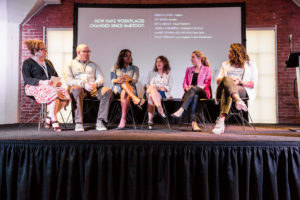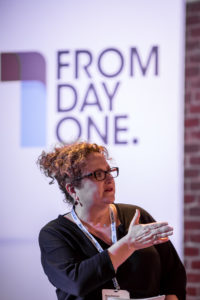#MeToo in the Workplace: How Have Things Changed?


The progress of the #MeToo movement has come in waves, starting in 2006 by activist Tarana Burke and then growing substantially in 2017 with the explosion of revelations about high-powered perpetrators of workplace sexual harassment. Now comes a fitting time to take stock of what could be the third wave: the real impact of the movement on everyday workplace behavior.
“The biggest change I’ve seen is people willing to subtly say, ‘No that’s not acceptable,’” said Rebecca Port, VP of talent at Netflix. “Whereas they might have tolerated some inappropriate behavior or microaggressions [before], more people will stop and say that they’re uncomfortable.”
Port was among the speakers on a panel at the From Day One conference in Los Angeles, moderated by Stacy Perman of the Los Angeles Times, who has covered the issue in the entertainment industry.
Perman asked panelists about the role of human-resources professionals in reporting cases of abuse, and whether employees should view their respective HR representatives as allies or enemies.

“HR has a responsibility to protect the company, first and foremost,” said Mandy Bynum McLaughlin, director of global diversity, equity, and inclusion at New Relic. “We as managers also have the responsibility to drive revenue and performance and sometimes those two things clash.”
McLaughlin shared an experience in which she was unable to report to HR about a manager who was inappropriately touching other employees. Over the course of a few months, she had to gain trust from sales-team members who confided in her and eventually built a case that resulted in the manager’s termination.
Netflix’s Port added that corporate culture plays a big part in what type of behavior is or isn’t tolerated.
“People [at Netflix] are very candid,” Port said. “We don’t shy away from exiting people. We pay people to leave all the time and don’t tolerate certain kinds of behavior. Because of that, [our employees] trust that HR will take action right away.”
Neta Meidav, founder of Vault, a company that empowers victims to report misconduct in the workplace, shared her experience of harassment, and how it would eventually prompt her to start her company to give a voice to individuals who are afraid to speak out.
“At my first job out of university, I was harassed by a very powerful man,” Meidav said. “I never considered reporting it. I didn’t want my career to be crushed before it even started, so I left.”

Months later, Meidav received a call from a fellow colleague who disclosed that she had been assaulted by the same man. It changed Meidav’s perspective on the significance of reporting harassment and she realized that coming forward can prompt multiple survivors of abuse to do the same and bring strength in numbers.
Jessica Childress, founder of the Childress Law Firm, addressed issues on the legal aspects of reporting and whether the law will keep pace with current workplace dynamics.
“The law has to reform to create a code of conduct which is going to be commensurate with what’s in your [workplace] code of conduct,” Childress explained.
She continued: “The Title VII Civil Rights Act, which is what governs sexual harassment, is not a civility code, so the law doesn’t require your workplace to be civil. However, all of us would say a core value of your company should be civility. The law is not likely going to change in my lifetime–however, civility does need to be a core value and companies should train on what it means to be civil.”
The discussion then turned to new concerns of men who are uncomfortable mentoring or even interacting with women, for fear of being accused of misconduct. While reports of sexual harassment have declined since the second wave of the #MeToo movement, some researchers have detected a backlash.

Zev Eigen, founder of Syndio, an HR analytics platform, said that he believes anyone who makes claims of discomfort because of the #MeToo movement, should be called out. Refusal to interact with a female colleague, he said, detracts from the seriousness of the matter and shows a lack of accountability for displaying appropriate behavior in a work environment.
“I don’t think it’s a valid thing to say,” Eigen said. “I think it’s designed intentionally as a rhetorical device and not a valid response to this, and it doesn’t seem to come from a genuine place of wanting help or not knowing what to do.”
Panelists also gave their thoughts on what progress needs to be made in the near future. Eigen said that technology will have a significant impact on providing solutions to many workplace issues, and encouraged employers to utilize these resources, rather than take the passive approach of “admiring the problem.”
“I’ve been on a lot of panels with people who don’t have actionable solutions that they can implement today to start solving problems,” he said. “I invite you to check out all of the opportunities in front of you within the [HR and diversity & inclusion] space.”
Quinisha Jackson-Wright is a journalist who has contributed to the New York Times, Business Insider, and The Muse. She is a U.S. Navy veteran and graduate of the University of Missouri-St. Louis
The From Day One Newsletter is a monthly roundup of articles, features, and editorials on innovative ways for companies to forge stronger relationships with their employees, customers, and communities.